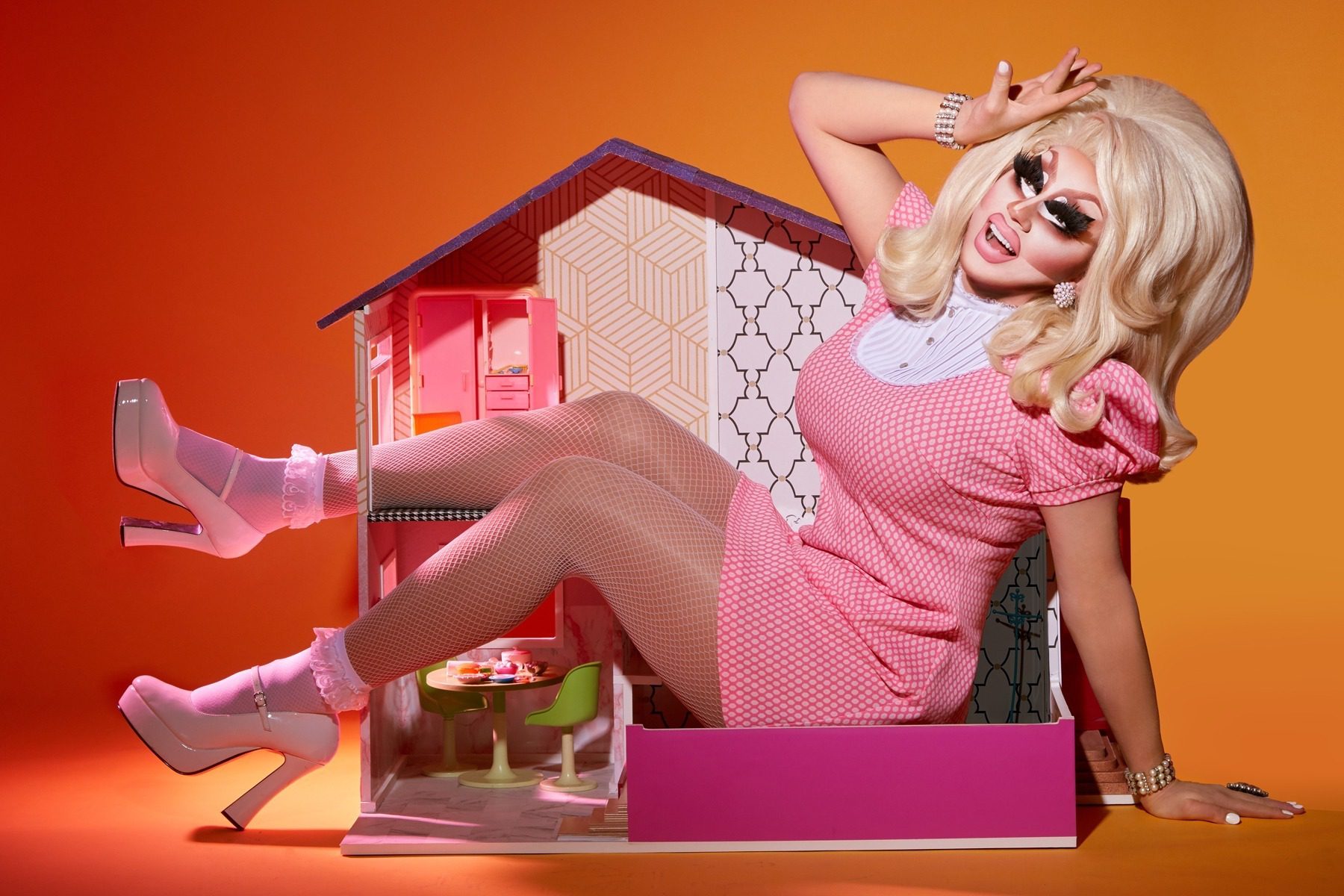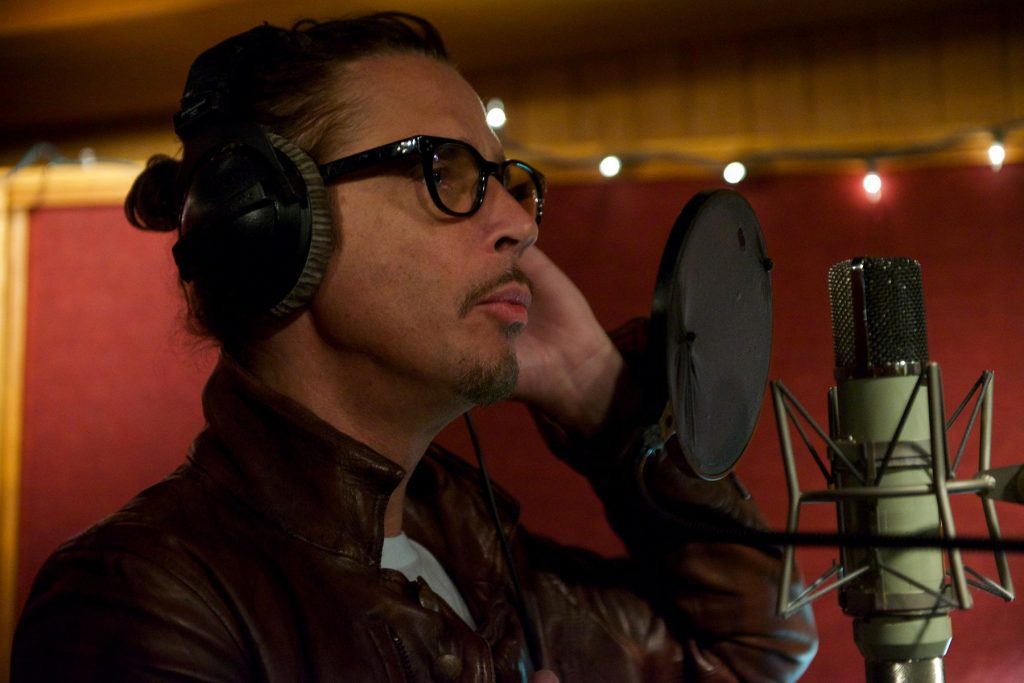
‘By the Rules of Nature, I Shouldn’t Be Here’: The Unlikely Rise of Trixie Mattel
A few hours before she’s set to take the stage as a quasi-Barbie doll drag queen known for her biting sense of humor and warm, honeyed voice, Trixie Mattel is just Brian Firkus — a “bald, unprepossessing person, who’s not from a great family, not from a happy background, who has used a bucket of paint to cheat the system,” as Firkus puts it plainly.
At the moment, Firkus, 32, is lounging in a robe at the Ritz-Carlton Perth, reminiscing over Zoom about his start more than a decade ago — before Trixie won RuPaul’s Drag Race All Stars, before she released her first country pop album, before she started touring the world to far-flung places like Australia — when there’s a knock at the door. (Trixie uses she/her pronouns; out of drag, Firkus uses he/him.) As if on cue, a hotel employee has arrived to deliver a complimentary bottle of wine. “What is going on?” Firkus says with a laugh, plopping back down on the couch and taking in the ridiculousness of the moment. “I grew up in a trailer on a dead-end dirt road where we lived so far out, we couldn’t even get public access television because it was too snowy. Now, I’m playing Jimmy Kimmel Live. I have two billboards up in Times Square. Even this hotel room is bigger than the house I grew up in. And now I’m getting free wine. It’s insane.”
If you’re not familiar with Mattel, it’s not for a lack of trying on her part. The drag superstar is on her way to building an empire. On top of her two-season stint on Drag Race (first in 2015 and then her winning run on All Stars in 2017), there’s her 2019 documentary, Moving Parts, which covers her rise to fame; her Skinny Legend comedy special; four albums, including her latest, The Blonde & Pink Albums, released June 24; two comedy web series hosted alongside her friend and fellow drag queen Katya, plus a New York Times bestselling “guide to womanhood” they co-authored (with another on the way); a cosmetics line; countless brand collaborations; an interview podcast; the Milwaukee bar she co-owns; the drag singing competition she judges on Paramount+; the $2.4 million renovation of a Palm Springs property for her recently released Discovery+ show, Trixie Motel; and the YouTube channel dedicated to keeping up with all of these projects.
If it’s gauche to proclaim your own success, to assert that it was intentional or (gasp) the result of a concerted effort to be someone, Firkus doesn’t care. He’s too aware of everything that stood in the way of getting here. Growing up in tiny Silver Cliff, Wisconsin (population 480), where he was raised by his Ojibwe mother alongside an older brother and two younger sisters, Firkus’ home life was marked by poverty, alcoholism, and instability. His first love was dolls — he idolized Barbie — but for most of his childhood, he wasn’t allowed to have any of his own. Though his mother wasn’t entirely discouraging (she eventually relented and gave her son a Ken doll), his stepfather, who Firkus says was both physically and verbally abusive, called Firkus “a Trixie” any time his behavior was deemed “too feminine.” At fifteen, not long after his stepfather allegedly pointed a gun at his head, social services relocated Firkus to his grandparents’ house, a little over 20 miles away in Wausaukee. “He [later] passed away of alcoholism,” Firkus says in Moving Parts, finishing with a flourish: “Ba-dum-chh.”
On Drag Race, this is the kind of personal backstory — delivered by queens in easy-to-parody confessional moments as they powder and contour in the mirror — often gets wrapped up into a tear-inducing, Emmy-clinching, reality-TV package. But Firkus doesn’t want his childhood to serve as some tragic, violin-tinged anecdote to contrast against the glimmering stardom he’s achieved as Trixie. That’s not to say that these stories aren’t important, but the persistent emphasis on them helps to solidify an association between queerness and trauma, the idea that people only become drag queens because they’ve been through something — an idea Firkus roundly rejects. In Skinny Legend, Mattel takes a jab at that assumption, joking, “Experts hypothesize that you’re gay because you were oversexualized as a child. But I’m not gay because my dad touched me, I’m gay because I loved it.” She cackles viciously before finishing, “I’m kidding, I did not have a dad.”
Firkus’ childhood in Silver Cliff isn’t something he likes to dwell on, but he doesn’t want to treat rural Wisconsin as a place he escaped. “What if I’m from a small town and I’m queer, but I like it?” he asks. “I might’ve been an unhappy kid, but it all ended up making sense later. Even my relationship to Barbie and not being allowed to play with dolls growing up, that influenced this character I’ve become. Every bad thing ended up being like an Act One gun, in a way.”
It can be difficult to get a read on Firkus’ emotions — about how all of this success might feel to someone who grew up as he did. And Firkus is the first to admit that he can be tough to crack, especially out of drag. As a rule, he hates trauma-dumping; it’s awkward verging on inappropriate to assume someone would want to hear about the terrible things that have happened to you. Worse than that, it’s committing the greatest sin he can think of: being uninteresting. “Bad things happen to everyone,” Firkus tells me. Onstage though, beneath the weight of an elaborately coiffed blonde wig, waist cinched into a colorful, Sixties-inspired number, it’s easy for Mattel to coax something out of that darkness. Told from the mouth of a statuesque drag queen (he stands six feet tall in heels), Firkus’ past can become a biting joke, or a clever lyric — a heap of straw spun into gold.
“I have a very open-door policy with the people who listen to me or watch me,” Firkus says. “Everything’s on the table, there’s no line I draw in the sand. Onstage, I don’t have any reason not to be honest all the time. I can share my most intrusive thoughts or the worst parts of my personality.”
Ahead of the release of The Blonde & Pink Albums, Mattel put out her second single, “This Town” featuring Shakey Graves. It’s an achingly earnest tribute to the town that made her. Over a jangling acoustic guitar, she reminisces about speeding down empty Wisconsin roads while reminding herself of the darker aspects she left behind. Another song, “C’Mon Loretta,” may be upbeat, but its lyrics dive into the story of Loretta Lynn’s abusive relationship, as Mattel sings disapprovingly: “She stands by his side/She’s tough as the strings on her guitar/Every fight is the same, girl/And he’s not gonna change, girl.”
Since the release of her third album, Barbara, in 2020, Mattel has gotten more comfortable tapping into her pop sensibilities, leaning into the genre even more on her latest release. “Love You in HiFi” and “Hello Hello,” are surf pop tracks drenched in California sunshine, while “Who Loves You Baby,” and “White Rabbit” (which features vocals from one of her songwriting idols, Michelle Branch) feel like radio hits straight out of the early 2000s.
“Compared to what I grew up playing, I can’t even believe I wrote a song like ‘Hello, Hello,’” Firkus says. “If I didn’t do drag, I would write more mid-tempo, introspective songs like ‘This Town,’ but if I’m writing it, if it comes out of me, then it’s still authentically me.”
Firkus’ path to performing — let’s call it Act Two — began when he moved to his grandparents’ house as a teenager, and everything changed overnight. “Suddenly, I had my own room, a safe home environment where people weren’t always screaming,” he says. “I was closer to school, I could see my friends more. I truly went from crying every day to being happy all the time.” A country musician with a filthy sense of humor, Firkus’ grandfather introduced him to the guitar. They had always been close, and as Firkus’ playing improved, the two would sit around the kitchen table singing Johnny Cash and George Jones. With his grandfather’s guidance, Firkus started to see a future for himself as a singer. He began focusing more on school with the hopes of getting into college, and eventually enrolled at the University of Wisconsin-Milwaukee to study musical theater.
To hear him describe it, going from Wausaukee to Milwaukee was like going from sepia-toned Kansas to the Emerald City. Back then, he was in the process of becoming, just making everything up as he went along: dating a hipster, listening to new music, basking in the freedom of his first drunken nights and first sexual experiences. “It took me like two weeks to completely change into this person I wanted to be,” he says. He hit the reset button, throwing out anything he’d previously used to hide parts of himself. “Even just having people ask if I was gay and being able to just say yes — there was no coming-out process. I just got to start over in this new truth. It facilitated this really healthy environment where I could have this earnest, academic experience during the day, and then at night I could get wine-drunk and play guitar at house shows, make out with my boyfriend on the bus, and then have a three-way in my dorm room. Every day was memorable, because I was just turning into the person I was supposed to be.”
Despite his newfound freedom, Firkus was struggling to gain momentum as a singer (he can still remember getting rejected from an open mic audition at a Potbelly Sandwich Shop). But then came drag. Firkus still dreams about the delicious mix of popcorn, booze, and hairspray in the air at Milwaukee’s Oriental Theater, where he began performing the role of Trixie, a sexy usherette in The Rocky Horror Picture Show (it was fate). Not long after, he started taking the stage as Trixie Mattel at local drag bars.
For a drag queen, her look started off relatively “natural.” She hadn’t developed her signature, exaggerated swoop of pitch-black, winged eyeliner. The most over-the-top part of her ensemble was the uncannily blue contacts she wore to complete her Barbie doll fantasy. But because Mattel kicked off her drag career in a production of Rocky Horror rather than a bar, her performances were a little different compared to the queens she performed alongside. “She was always very theatrical,” says fellow Drag Race alum Kim Chi, Firkus’ longtime friend. “I thought she was so talented, but she wasn’t really a lip-sync girl, she was a performer. I would go on stage and do a K-pop song and then she would do something like ‘Little Shop of Horrors’ with a homemade puppet.”
On the surface, Mattel is everything Firkus couldn’t or wasn’t allowed to be growing up: hyperfeminine, skinny, beautiful, vapid, rich. But when she opens her mouth, it’s not a facade; what comes out is the truth. “People know that I’m a person under there,” he says, gesturing to the smooth baby face he normally makes up with a razor-sharp contour. “I grew up in a household of brown, Native American women. No one wore makeup, everyone was plus-sized, and we were poor. So to me, creating Trixie as this critique of the idealized American beauty while being a bald man from the country… It’s comedy, it’s subversive, it’s an anchor for people. It’s like, by the rules of nature, I shouldn’t be here, but I am.”
Music took a backseat to drag as Firkus began paying the bills by booking gigs in Milwaukee, Madison, and Chicago. “Trixie’s always been a workhorse, she’s never wanted to stay still,” recalls Kim Chi. “She was always quick-witted and theatrical, but when we were coming up, I didn’t even know she could sing. I didn’t even know she was interested in that until after Drag Race.”
Being eliminated from the reality competition show in 2015 just forced Firkus to double down. With a growing platform and a persona he was constantly refining — he bought bigger wigs, sharpened his makeup, ditched the contacts, and leaned into his dark sense of humor — Firkus returned to music, this time in drag. Mattel’s debut studio album, Two Birds, was released in 2017, with One Stone arriving the next year.
In the crowded landscape of drag queens-turned-recording artists, Mattel stands alone as an alt-country, sometimes-pop artist. There are no gimmicks to her music, and on her first two records, she serves up classic country: raw, clever, honest songs set to a strumming guitar and weeping fiddles. It’s easy to look at Mattel and write her off as the capitalist Barbie her drag persona is meant to mock, but her songs are a reminder that her perspective isn’t something you can mass produce, it’s rare. In One Stone’s “Red Side of the Moon,” for example, Mattel’s plaintive vocals tell a story loosely based on sensational tabloid rumors that Dolly Parton’s childhood friend Judy Ogle was her secret lover. It’s a ridiculous premise that Mattel approaches with surprising tenderness, focusing on the loneliness of loving someone who’s always in the spotlight: “Judy’s never mentioned in the papers/Judy’s never noted in the news/Judy knew that loving her was safer/ Loving from the red side of the moon.”
Firkus’ friend, TikToker Brittany Tomlinson (a.k.a. Brittany Broski) actually describes Mattel’s musical persona as “Dolly Parton, if she never made it out of the country.” The fact that Mattel embraces rather than shuns her roots is what first drew Tomlinson to her friend’s comedy and her music. “You grow up in such a stunted environment when it comes to gay rights and to self-expression,” she says, “that to see people living authentically and creating art while still holding onto that country aesthetic and sound, it’s two things that society says shouldn’t exist together but they do.”
It’s a principle that embodies the essence of Mattel — and Firkus. “I’m always obsessed with everything having a twin, some kind of a balance,” he says. “Performing and living as two people probably has something to do with it.”
In early June, I meet up with Firkus — in full Mattel mode — at a nondescript Hollywood studio where she and Katya film their Netflix web series, I Like to Watch. Wearing a silky, psychedelic-print jumpsuit, Mattel settles into the break room and takes a moment to catch up on text messages. It’s the middle of an exceptionally busy period, even for her, between promoting the premiere of Trixie Motel, dealing with the property’s first bookings, juggling her upcoming tour dates, and managing the release of her double LP.
There’s no secret strategy to her success, nothing more mysterious than throwing as much against the wall as she can and relentlessly pursuing what sticks with a business acumen that’s always come naturally. It puts her and Katya on two opposite ends of the spectrum, work ethic-wise, though she admits, “Katya helps remind me that it’s not that serious — we’re cross-dressing, not putting stents in people’s hearts.” Still, she can’t turn that part of her brain off.
Take Trixie Motel, for example. Mattel and her partner, producer David Silver (who also stars in the show), were on vacation in Palm Springs for Mattel’s birthday in late August of 2019, joking about the idea of a Trixie-themed hotel. They laughed and mostly forgot about it until they were deep into lockdown, watching hours and hours of reality TV, including A Very Brady Renovation. It brought Mattel right back to the idea. She started browsing Zillow, zeroing in on a bright-pink property zoned as a condo. “It almost felt like there were big flashing lights saying ‘This Is Your Exit,’” she says. She couldn’t let go. “David went to look at it while I was working and traveling, and we made an offer. We bought the motel before the show was even green-lit. We were going to do it no matter what, because we believed in it.”
She’s a drag queen with a makeup company, so Mattel loves the transformational aspect, of course, but she was also excited at the prospect of subverting the heteronormative world of home design shows. “It’s always about the hetero family unit in those reno shows,” she says. “This show is not only not about a family unit, it’s about a business. It’s about queer people trying to make a dollar.”
With the help of project manager David Rios, designer Dani Dazey, and a rotating cast of guests including comedian Nicole Byer, rapper Iggy Azalea, and former Real Housewives of Beverly Hills star Lisa Vanderpump, Mattel and Silver remade the property, turning it into a stunning retro retreat in the desert.
Mattel went into the project knowing it would be stressful, that the pandemic might inflate costs and delay materials, but she wasn’t quite ready for how vulnerable it would make her as well. “It was definitely a stress on our relationship,” she says. “It’s stressful to renovate, it’s stressful to make a TV show, it’s stressful to start a business. David and I did all of that at the same time. So that was scary.”
It’s only when Firkus is back in Milwaukee, jogging around his old neighborhoods, that some of the stress fades, and the enormity of his accomplishments really sinks in. The city is so central to Firkus’ start, and everything that happened next, that he’s kept close ties to it: He moved his mom into a house there, bought himself one, too, and eventually became a co-owner of This Is It!, Wisconsin’s longest-running LGBTQ+ bar and the very first place he drank after turning 21.
“I’ll run miles around the city and nothing makes me feel more completely realized, like ‘Holy shit, bitch, you have done it’ than that experience,” he says. “Running through the college campus, my first apartment, past the Oriental Theater — it’s just like, ‘Wow, you really did everything you could have imagined.’ And I don’t dream small.”
Now, for the first time in her career, Mattel is actually thinking about slowing down. Maybe once the tour is over, she’ll cut back on performing live. She loves the camera, so she imagines she’ll always be drawn to her YouTube channel or TV projects, but maybe, finally, it’ll be time for her to take a break, even imagine retirement. “I think I’ve been pushing for this kind of big crescendo for myself because on the flip side of it, I am ready to loosen the corset a little bit and just do what I enjoy more,” she says. “My version of retirement is what Katya does now: very little urgency, only doing what I want when I want — no self-appointed pressure to make a lot of money or be seen by a lot of people.”
But that doesn’t mean she has any desire to fade into the background — not after all the work she’s put in. “We always talk about how drag is so big now, but we don’t really talk about how recently it wasn’t,” Firkus says. “I started drag before Drag Race, when the most you could get paid was $40, and not even the guys in the gay bar wanted to talk to you, because drag queens were weird. So yeah, I get tired, but I’m not going to have children. My only legacy, the only reason I was here and existed is because I helped advance this performance art.”



